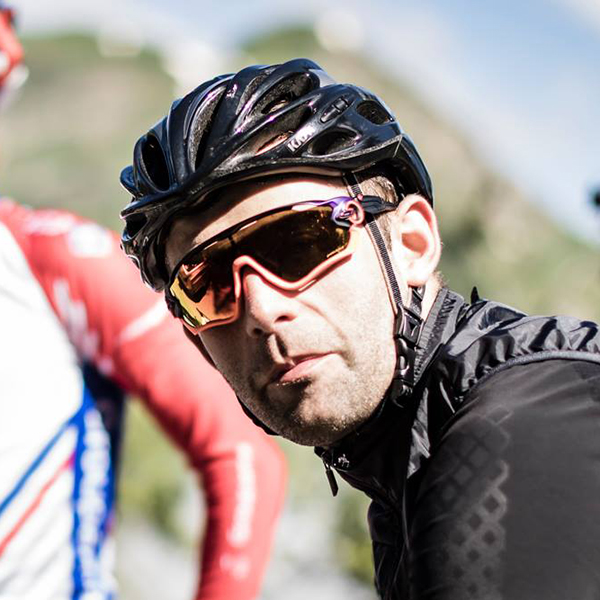While carbon has become the dominant material at the pinnacle of the sport, the best aluminium road bikes still have loads to offer, from low weights to great affordability.
At the entry-level end of the road bike market, aluminium frames are almost ubiquitous.
Aluminium road bikes around £1,000 can compete with pricier machines, with great specs and features such as disc brakes, which are available on more and more budget bikes.
Spend a little more and the prevalence of aluminium thins out in favour of cheaper carbon fibre bikes.
However, aluminium bikes at this price point – roughly between £1,000 and £2,500 – still regularly offer considerably better value, and sometimes a better ride, than similarly priced carbon models.
This list includes options for everyone, as reviewed by our test team, who between them have tested many of the best road bikes.
The Cannondale CAAD13 is still our best overall aluminium road bike. It remains a showcase for the latest aluminium tech and a bike that can fight it out with all but the absolute best carbon fibre machines.
The Trek Domane AL 2 Gen 4 is our budget pick, having won our 2024 Budget Road Bike of the Year award, and the Condor Italia RC Disc is our premium choice.
Keep reading to see more of our recommendations or jump to our buyer's guide.
SQUIRREL_PLAYLIST_10195133
Editor's note: this best list was updated with our latest aluminium road bike reviews on 20 January 2025, plus a new buyer's guide.
Best aluminium road bikes, as rated by our expert testers
Best overall: Cannondale CAAD13 Disc 105
SQUIRREL_TEXT_13122563
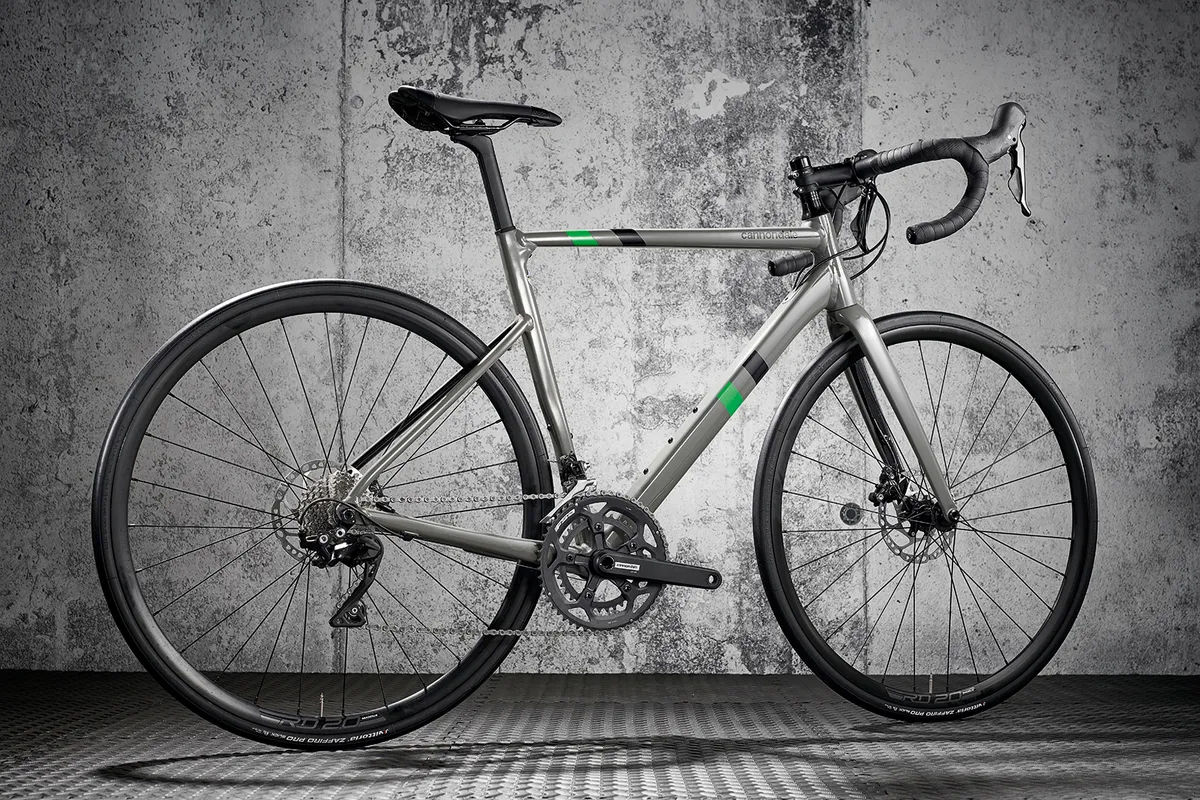
- £2,250 / $2,300 / €2,299 / AU$3,499 as tested
- Pros: Exciting ride quality
- Cons: Not cheap
The Cannondale CAAD13 was released in 2019, with the brand revamping the previous CAAD12 to embody new trends, such as dropped seatstays, wider tyres and aerodynamics.
For the price, it isn't the best value, nor is it the lightest, but once you start riding it, all of that is swept away. It has accurate handling, a remarkably smooth ride and is a brilliant all-round performer. In fact, it gives many carbon bikes a run for their money.
- Read more: Cannondale CAAD13 Disc 105 review
SQUIRREL_13122563
Best budget: Trek Domane AL 2 Gen 4
SQUIRREL_TEXT_13123797

- £1,050 / $1,200 / €1,199 / AU$2,000 as tested
- Pros: Impressive handling and spec for an entry-level bike
- Cons: 8-speed only; mechanical disc brakes not as powerful as hydraulics
Our budget road bike of the year in 2024, the latest Trek Domane offers a quality frameset with a full-carbon fork with 38mm clearance. You also get cables routed internally from the headset, for a clean look – and mounts for both mudguards and a top tube box.
Along with the bike's easy-going handling and smooth ride, these features enable you to set up the Domane for light off-road use, touring or commuting.
At 10.6kg for a size 58, the Domane isn't overly heavy either. The wheels, but not the 32mm tyres, are tubeless-ready. At this price, the Shimano Claris groupset is to be expected, as are the mechanical disc brakes, although a hydraulic setup would provide more stopping power.
- Read more: Trek Domane AL 2 review
SQUIRREL_13123797
Best premium: Condor Italia RC Disc
SQUIRREL_TEXT_13163955

- £4,671 / $6,070 / €5,570 / AU$10,500 as tested
- Pros: Well-balanced with handsome looks; custom build
- Cons: Heavier than carbon alternatives
Condor sells the Italia RC Disc as a frameset, so you can build the bike to your own specs. Handmade in Italy, the frame is lighter and stronger than many alloy bikes thanks to its 7000-Series alloy. There's no aero shaping, but clearance for 32mm tyres and a geometry that's not too aggressive.
We specced the test bike with Shimano Ultegra, Mavic Cosmic S 42 wheels with Continental GP5000 S TR 28mm tyres and a Deda cockpit. Out riding, the bike is sharp-handling and responsive but comfortable, although at 8.6kg it's heavier than some carbon rivals at its price point.
- Read more: Condor Italia RC Disc review
SQUIRREL_13163955
Giant Contend 1
SQUIRREL_TEXT_13081205
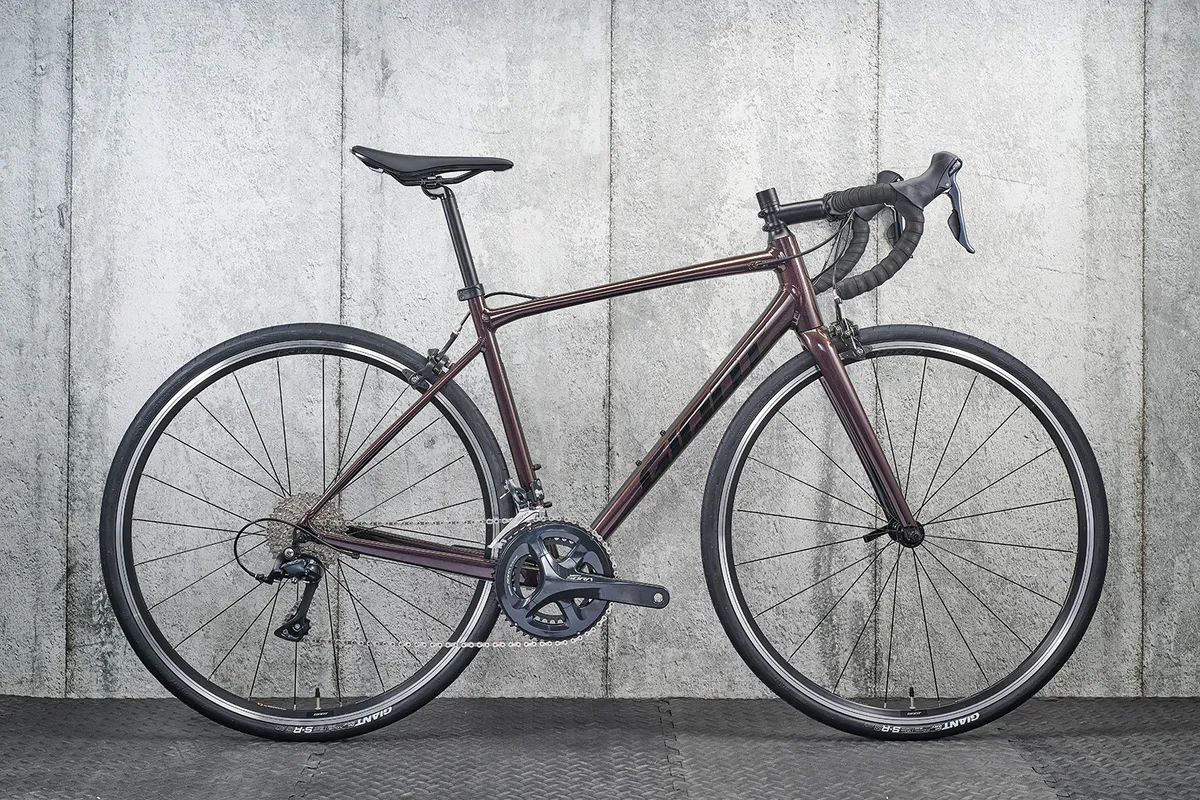
- £999 / €1,150 as tested
- Pros: Great quality frameset; comfy 28mm tubeless-ready tyres
- Cons: Front end doesn't absorb as much vibration as rear
The Giant Contend impressed us a lot during testing and we rated its rewarding ride and slick components package. The aluminium frame is neatly welded and there's an all-carbon fork and Giant's D-shaped seatpost, which is claimed to reduce road vibration transmitted to the saddle.
The Contend 1 is fitted out with Shimano Sora 9-speed groupset, with ratios down to 1:1. Tektro rim brakes. Tubeless-ready Giant wheels and 28mm tyres are other spec highlights.
The front and rear mudguard fittings and rack compatibility make this ideal as a commuter bike too.
- Read more: Giant Contend 1 review
SQUIRREL_13081205
Cannondale CAAD Optimo 1
SQUIRREL_TEXT_13151965
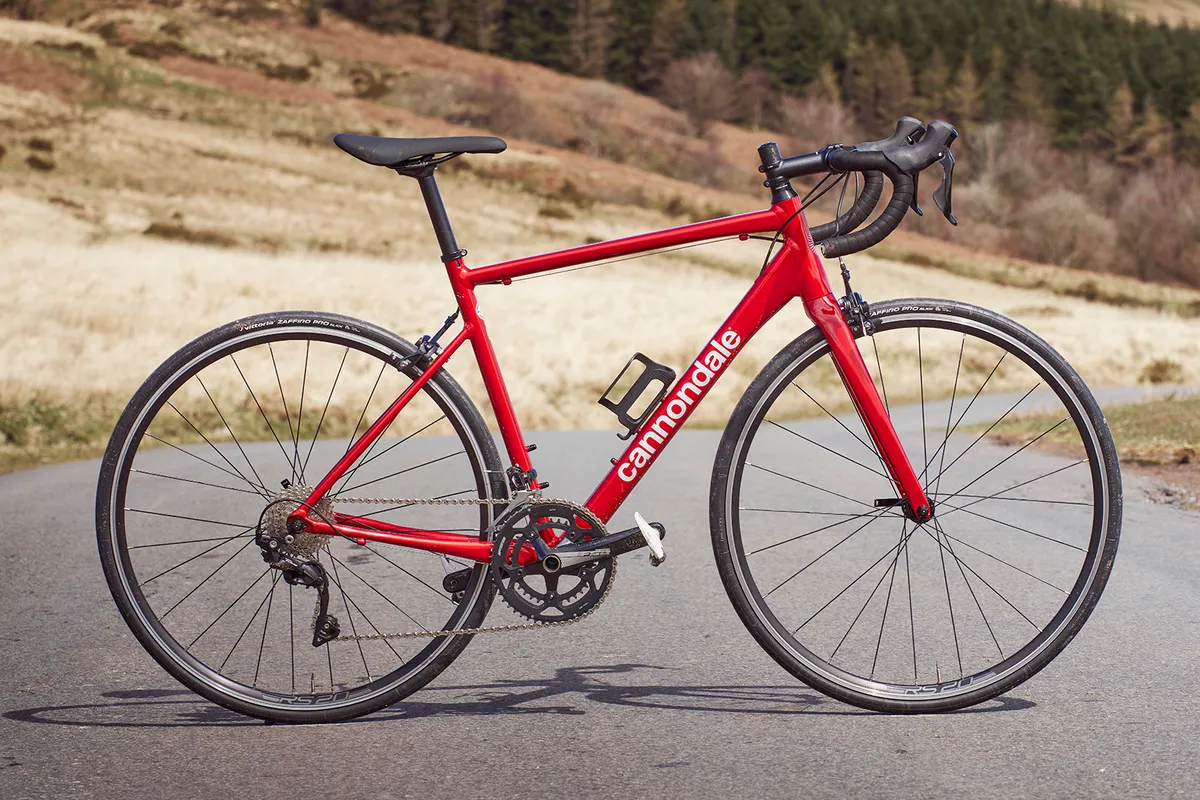
- £1,300 / $1,305 / €1,499 as tested
- Pros: Reasonable weight; well balanced
- Cons: Not a complete 105 groupset
Despite originating from Cannondale's entry-level road bike range, the Optimo 1 is worthy of the CAAD designation, associated more closely with the brand's more illustrious models.
The classy alloy frameset is the highlight of the build, made up of mostly Shimano 105 components.
The Vittoria Zaffiro tyres feel fast-rolling and there are fittings for mudguards and a rear rack. Its rim braking works well, but restricts you to 25mm tyres.
- Read more: Cannondale CAAD Optimo 1 review
SQUIRREL_13151965
Cannondale Synapse 1
SQUIRREL_TEXT_13080937
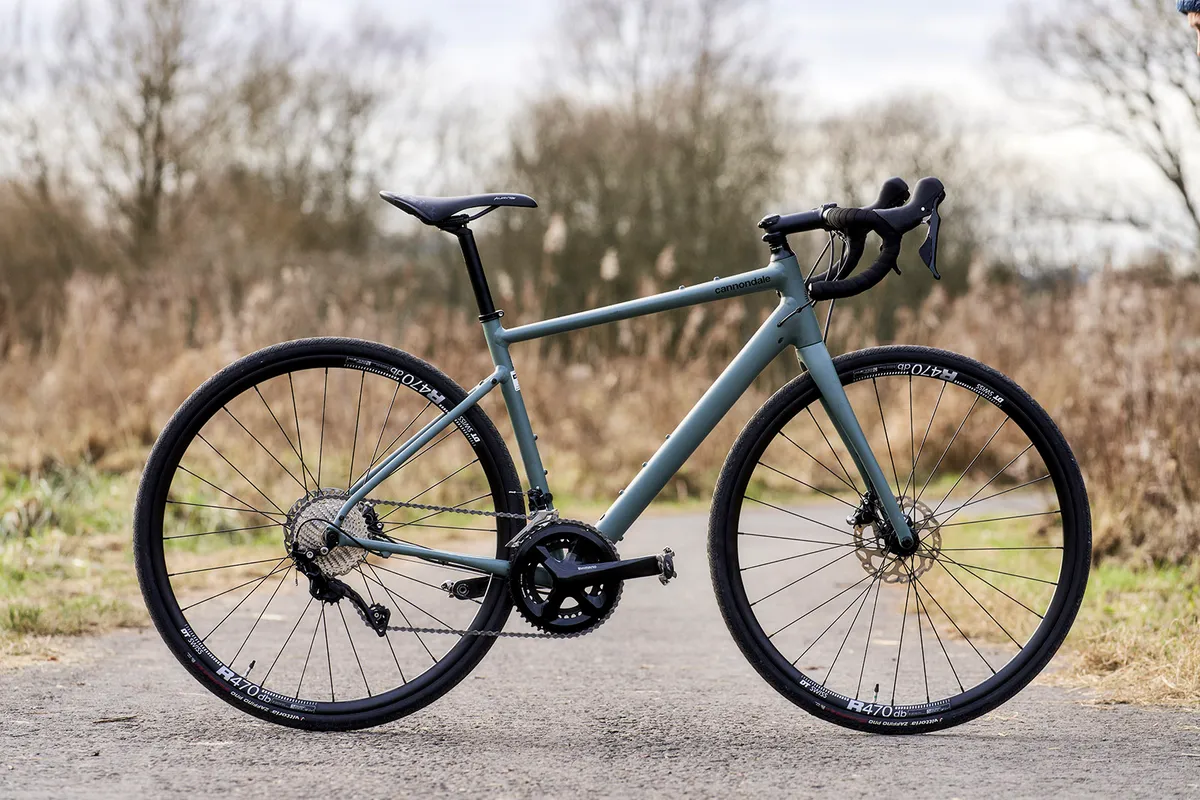
- £1,900 / €1,995 as tested
- Pros: Comfortable ride; good tyre clearance
- Cons: Pricier than many mainstream rivals
The Synapse 1 is the highest spec of Cannondale's alloy Synapse range. As such, it's equipped with a Shimano 105 groupset with hydraulic disc brakes, although there's a swap-out to a non-series crankset.
The well-finished frame has a full set of luggage mounts, including top tube bolts and three bottle-mounting points.
Cannondale has a reputation for the good quality of its alloy frames and the Synapse is no exception. We found it lively, quick and comfortable, and there's room to spare with 32mm tyres (as measured) fitted. The 9.3kg weight and wide gear range make for easy climbing.
- Read more: Cannondale Synapse 1 review
SQUIRREL_13080937
Cube Attain SLX
SQUIRREL_TEXT_13080936
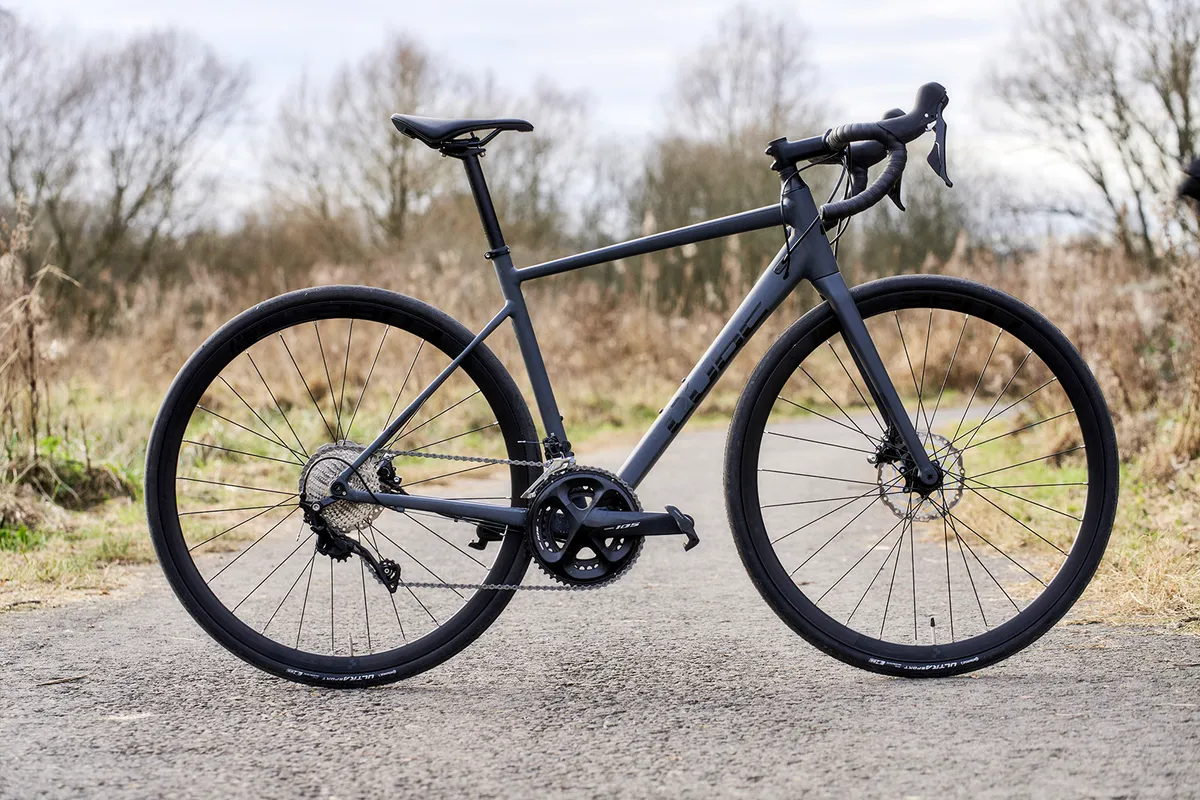
- £1,600 / €1,599 / AU$2,499 at tested
- Pros: Fast and lively; full Shimano 105 groupset
- Cons: 28mm maximum tyre clearance; no rack mounts
The Cube Attain's alloy frame boasts smooth welds, although it lacks some of the mounting points now typical on bikes with ultra-endurance and off-road pretensions. You can add mudguards, but there's only clearance for 28mm tyres when many road bikes are heading well over 30mm.
The quality spec includes a complete Shimano 105 groupset with hydraulic disc brakes and Cube's own wheels. The geometry is quite racy, leading to a rewarding ride with nimble handling, although the Attain is limited to road riding and the lightest off-road excursions, missing out on the current all-road riding trend.
- Read more: Cube Attain SLX review
SQUIRRELT_13080936
Cube Axial WS Race
SQUIRREL_TEXT_13096852
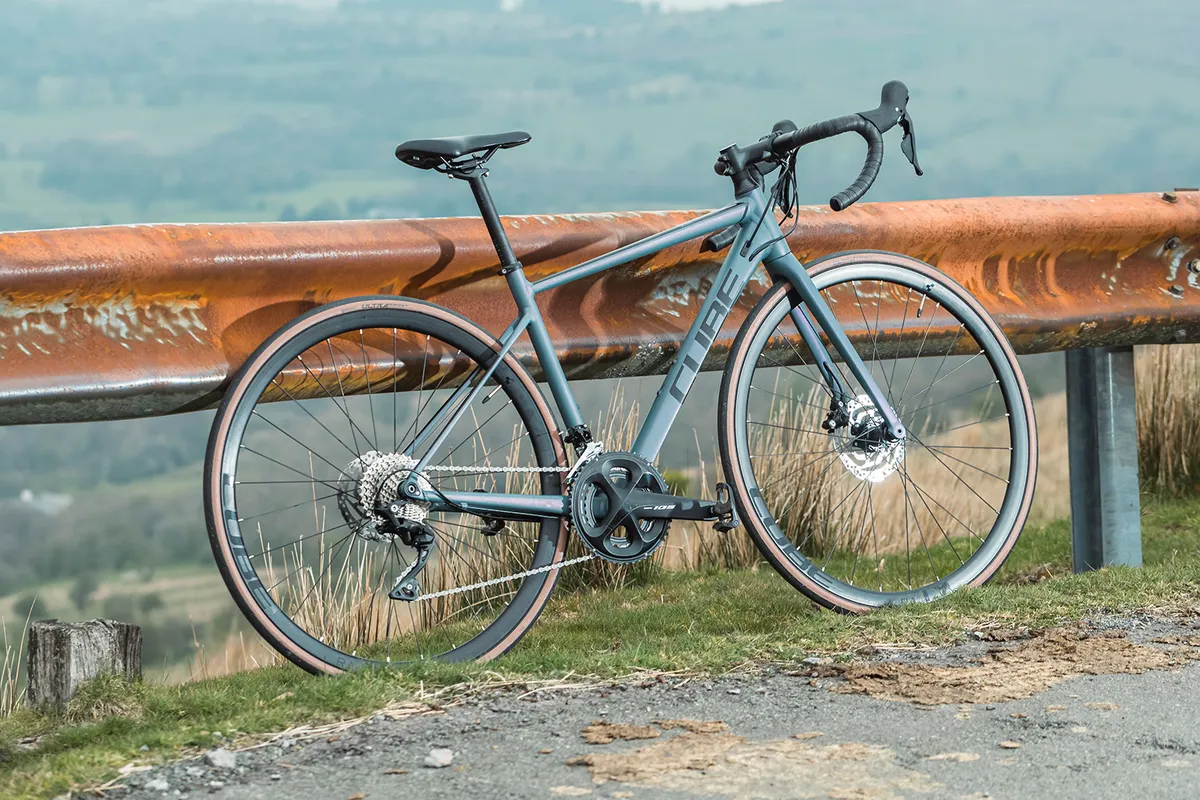
- £1,749 / €1,649 as tested
- Pros: Quality spec; lots of low gear range for hillier terrain
- Cons: Awkward handlebar shape
The Cube Axial is the women's version of the gender-neutral Attain, with Cube branding its Axial frame HPA, for High Performance Alloy.
The frame includes thru-axles for more precise wheel placement than quick releases. There are mudguard mounts and Cube sells mudguards designed specifically for the bike.
The spec includes a full Shimano 105 11-speed groupset, complete with its powerful hydraulic disc brakes, but the Axial range starts at around £1,000 for the lowest spec, fitted with Shimano Claris 8-speed.
The 28mm tyres measure up around 30mm although the Axial's tyre clearance isn't as generous as on some frames.
Despite the "Race" in the name, this is an endurance-focused aluminium road bike, with a more upright ride position.
- Read more: Cube Axial WS Race review
SQUIRREL_13096852
Kinesis R2
SQUIRREL_TEXT_13153243
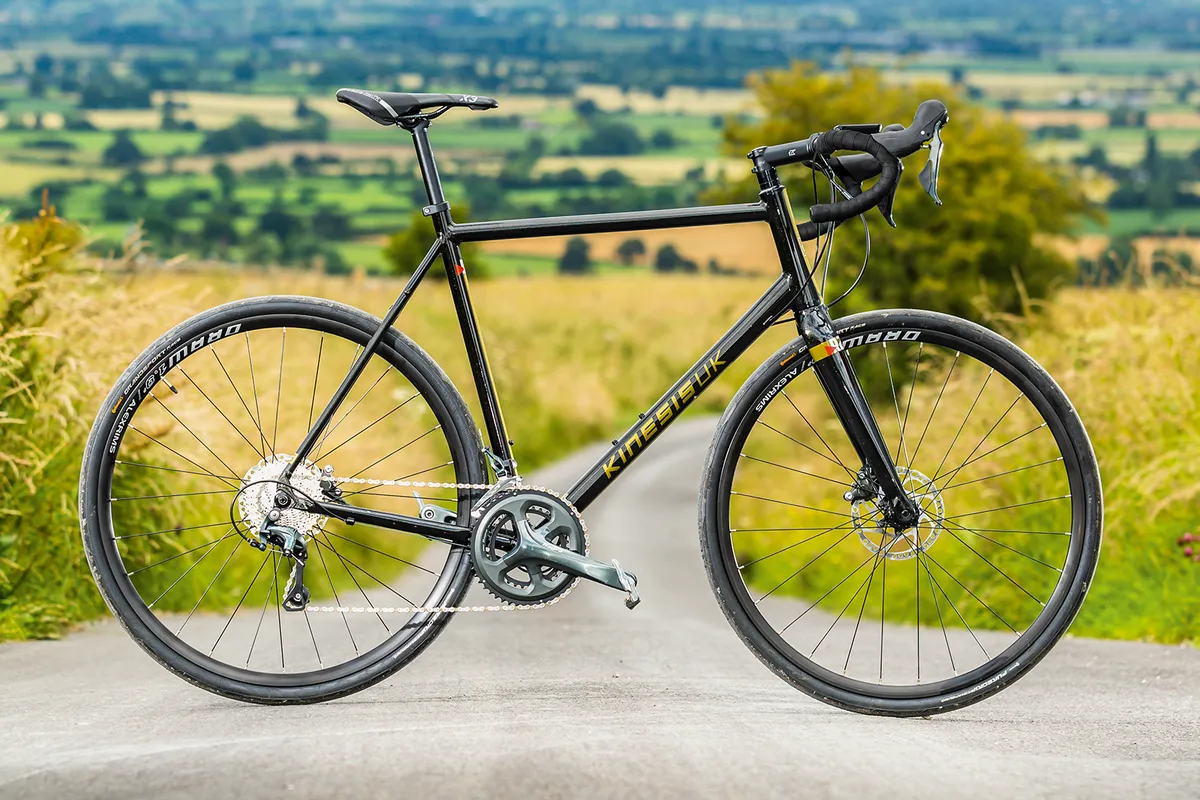
- £1,680 as tested
- Pros: Good to look at and ride / dependable build
- Cons: On the heavy side
In making the R2, Kinesis hasn't tweaked much from its predecessor, the R1, except for adding another chainring on the front.
Even with a 2x drivetrain, the R2 is adept across most terrain, including light gravel, thanks to 32mm tyres and Alex rims, which are designed for cyclocross.
Weighing 10kg, the R2 is never going to fly up climbs. But with mounts for racks and mudguards, plus hydraulic disc brakes, it'll make an agile winter bike and it's zippy enough to ride all year round.
- Read more: Kinesis R2 review
SQUIRREL_13153243
Specialized Allez E5
SQUIRREL_TEXT_13120224

- £1,000 / $1,200 / €1,200 / AU$1,800 as tested
- Pros: Fast handling; slick gearing
- Cons: Disappointing braking
The entry-level bike in Specialized's road line-up, the Allez E5 has a quality frameset with 35mm tyre clearance that would warrant future component upgrades. Specialized has relaxed the geometry for versatility, while retaining the sharp handling.
With an eight-speed drivetrain and broad ratios, there's plenty of climbing potential despite quite big jumps between gears and the 10.3kg bike weight. We were disappointed in the mechanical disc brakes though, which felt stiff and lacking in power.
- Read more: Specialized Allez E5 review
SQUIRRELT_13120224
Specialized Allez Sprint Comp
SQUIRREL_TEXT_13137897
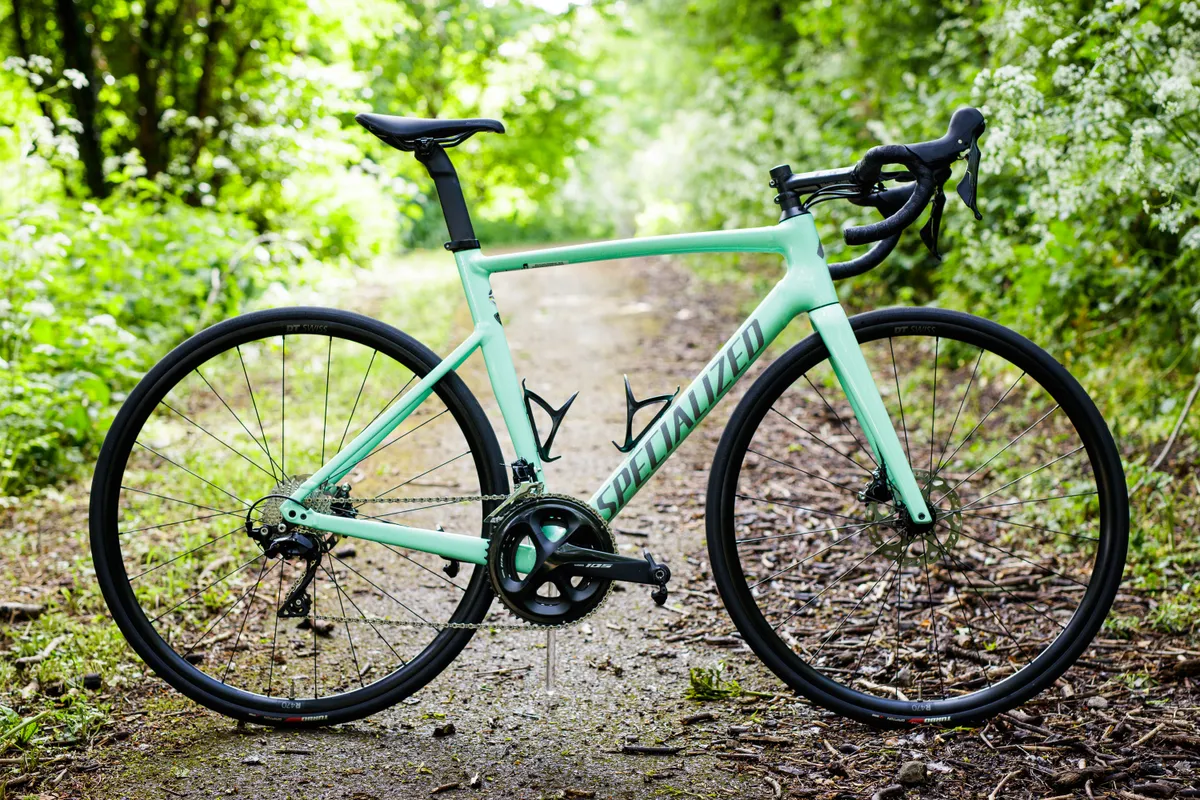
- £2,650 / $3,000 / €3,500 / AU$4,200 as tested
- Pros: Stiff frame with exemplary response
- Cons: It would benefit from a wheel upgrade
The Allez Sprint Comp borrows from Specialized's pro-level Tarmac SL7, with the same geometry and aero tube profiles. Specialized also claims similar ride characteristics and it's a bike that you'd be hard-pressed to tell from a carbon frame.
The ride is a great mix of stiffness when pedalling with smoothness and there's a fast, exciting feel. It comes stock with 26mm tyres, but there's room in the frame for 32mm rubber.
The Allez Sprint Comp would benefit from a wheel and tyre upgrade though, and its weight isn't competitive with similarly priced carbon bikes.
The Allez Sprint we reviewed came with the previous-generation Shimano 105 groupset, but it's currently available with the latest Shimano 105 groupset.
- Read more: Specialized Allez Sprint Comp review
SQUIRREL_13137897
Specialized Allez Sport
SQUIRREL_TEXT_13176182
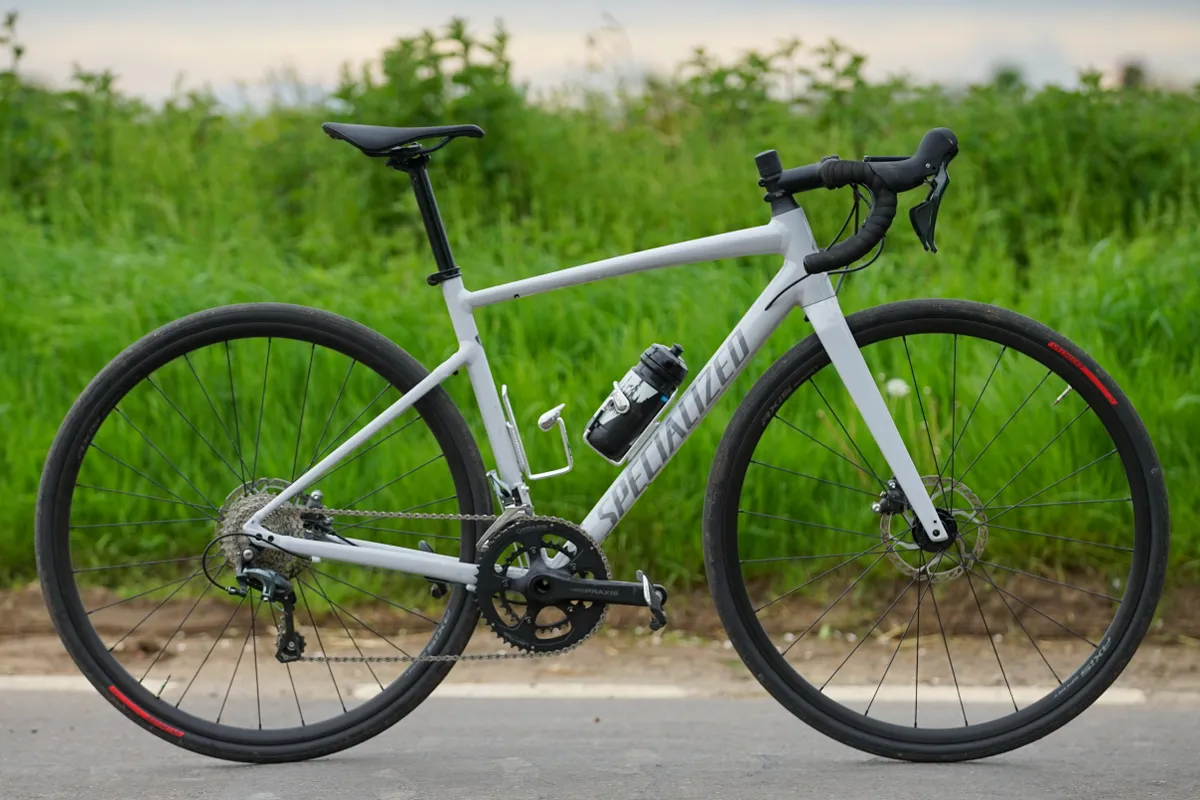
- £1,600 / $1,800 / €1,750 / AU$2,500 as tested
- Pros: Commuter-friendly; nimble handling
- Cons: Uninspiring wheelset
Dispensing with rim brakes on the Allez Sport has enabled Specialized to increase tyre clearance to an impressive 35mm. When rolling on wider rubber, the Allez Sport remains comfortable on iffy surfaces.
Clearance decreases to 32mm with mudguards, for which it has mounts. You can also fit a rear rack, which makes the Allez Sport a great commuter or winter bike.
The endurance geometry puts you in a fairly relaxed riding position, but that's not to say the Allez Sport isn't fun to ride.
The wheels and tyres left us wanting, but these are components you could upgrade in due course.
- Read more: Specialized Allez Sport review
SQUIRREL_13176182
Standert Kreissäge RS

- £5,560 / $6,599 / €6,599 as tested
- Pros: Striking looks; customisable spec
- Cons: Rigid ride; import duties raise price
Berlin-based Standert offers a custom spec on its good-looking scandium/aluminium alloy Kreissäge frameset. There's fully integrated cabling, adding to the clean looks and space for 30mm tyres.
The Kreissäge's geometry is racy and the handling sharp, responsive and confidence-inspiring. It's clearly designed for the better-surfaced German roads though and felt rather over-rigid on UK tarmac. Import duties and delivery costs inflate the price for non-EU based riders.
- Read more: Standert Kreissäge RS review
Trek Émonda ALR 5
SQUIRREL_TEXT_13151945
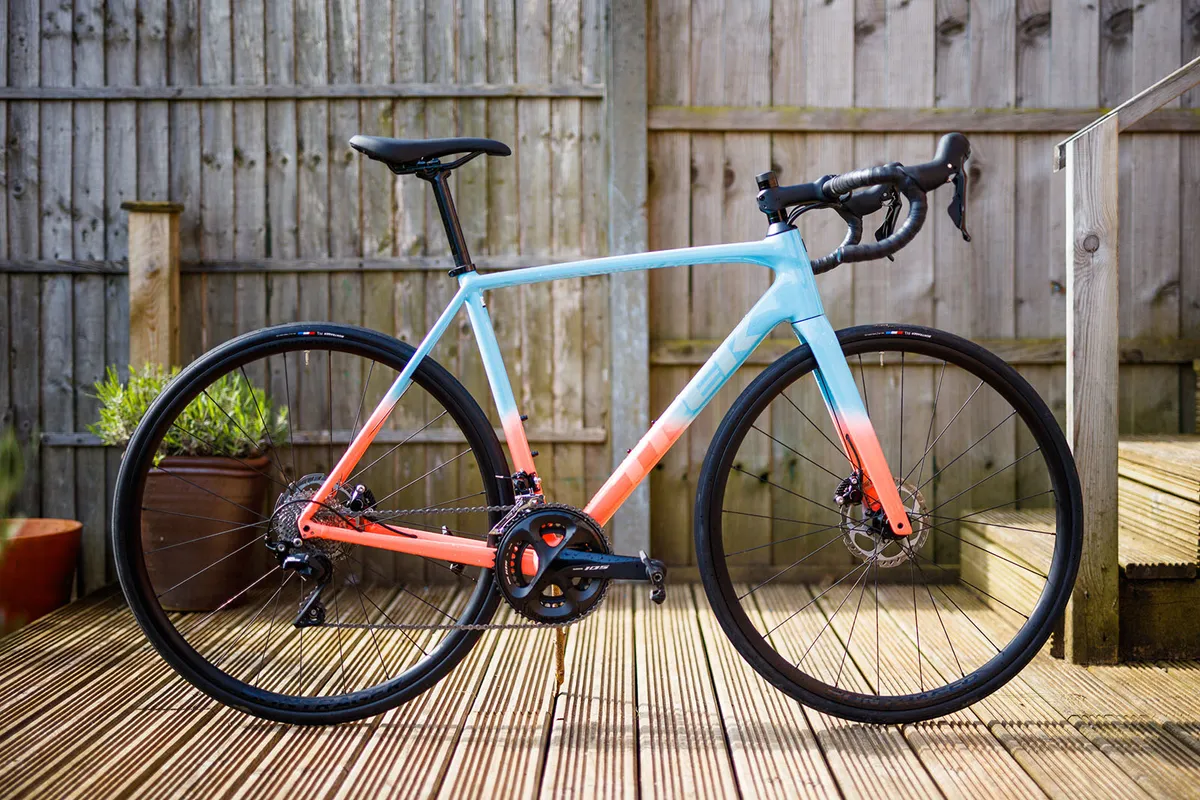
- £2,325/$2,300/€2,499/AU$3,500 as tested
- Pros: Good looks; compliant ride
- Cons: Sluggish tyres
The Trek Émonda ALR 5 proves that performance road bikes don't have to be made from carbon. In fact, the frameset weighs in only a fraction heavier than the carbon version, the Trek Émonda SL 5 Disc.
A compliant ride and trusty steering ensure the alloy Émonda is competitively priced.
However, sluggish tyres and leaden wheels take the gloss off the Émonda's performance.
- Read more: Trek Émonda ALR review
SQUIRREL_13151945
Why you can trust BikeRadar
BikeRadar has been an authority on bikes and cycling tech since its inception in 2007, delivering the world’s best riding advice.
We have experts testing all types of bikes, parts, clothing and accessories, from road, mountain and gravel bikes to commuting, bikepacking and electric bikes.
Our reviews are always editorially independent – with no exceptions. Our reviewers comprehensively test all products in the real world, always reflecting on performance, value and the wider market when delivering their verdicts and review ratings.
We have more than 15,000 product reviews available at your fingertips, as well as expert buying, maintenance, training, skills, health and fitness advice.
Our annual Bike of the Year test is an industry benchmark and the BikeRadar team consists of some of the most experienced riders and testers in the business.
Aluminium road bike buyer’s guide
Who are aluminium road bikes suitable for?
Aluminium road bikes make great, affordable entry-level road bikes for riders who are just getting into road cycling and who don’t want to spend too much.
They’re also a good option for commuters, because they can usually withstand plenty of abuse and most are equipped with mounts for mudguards and a rear rack.
Mudguards are also very useful for wet rides and many experienced cyclists will choose an aluminium bike as a winter road bike or training bike.
Pros and cons of aluminium road bikes
Aluminium road bikes tend to be cheaper than bikes made of other materials, particularly carbon bikes. They usually sit mid-way weight-wise between carbon bikes and steel bikes and may not be much heavier than a carbon machine.
Depending on how it’s engineered, an alloy bike can be as stiff as a carbon bike, but still offer similar levels of compliance and ride comfort.
Although alloy tubing can be formed into complex shapes, this usually increases weight. So although you can find aluminium bikes with aerodynamic tube shapes, the best aero road bikes are usually made of carbon fibre.
Likewise, the best climbing bikes are almost always made from carbon fibre for its lower weight, particularly because these often include aero tube profiles.
Since aluminium bikes tend to be built with lower-priced, heavier components, they can be a good platform for upgrades, which may improve performance and lower the full bike weight.
Aluminium vs carbon road bikes
Carbon fibre has taken over from aluminium (and before that steel) as the material of choice for many of the best road bikes. Premium carbon fibre frames are in general lighter than alloy and it’s easier to engineer specific mechanical properties using carbon fibre.
Carbon-framed bikes are usually more expensive though, because frame construction requires more labour. They’re easier to damage in a crash too, and internal damage to a frame tube can be difficult to spot and potentially dangerous.
A lower-priced carbon frame may not be lighter than an aluminium frame either, due to the number of carbon fibre layers and the amount of resin filler used in construction.
Do aluminium bike frames rust?
An advantage of an aluminium bike frame, as opposed to steel, is that it won’t rust if you scratch or chip the paint. The inside of the tubing won’t corrode either.
Alloy bikes are susceptible to galvanic corrosion though. This happens when they’re in close contact with a different metal or even a carbon bike part. When the two parts come into contact with a salt solution, such as road salt, sweat or even an electrolyte drink, they form what is essentially a battery, which will over time eat away at the metal.
So it’s important to clean your bike if it has come into contact with a salt solution. Sweat from indoor training is a prime cause of galvanic corrosion and has been known to cause parts to fail, particularly alloy handlebars.
Aluminium frames are also subject to stress fractures and these can grow with continued use. If you have a crash on your alloy bike, it’s important to have it checked by a shop to make sure it’s safe to ride.
